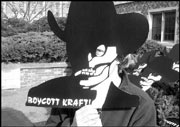FIRST JOE CAMEL got shot down. Now anti-smoking forces are training their guns on the Marlboro Man.
In protests this week at the University of Washington, where Marlboro maker Philip Morris was recruiting students for summer jobs, a small group of demonstrators called on the company to retire the chain-smoking cowboy. Activists have been pressuring local grocery stores as well, asking managers, with some success, to remove the offending icon from in-store displays.
“It’s an ad campaign specifically designed to addict kids,” asserts Patti Lynn of Infact, a Boston-based organization that helped stage the UW protest and is campaigning against the cowboy nationwide. Similar charges of targeting underage smokers were leveled against Joe Camel, the penis-faced cartoon character who was killed off by its master, R.J. Reynolds, in 1997 after a decade of controversy.
Raising a ruckus against companies when they come to recruit is not a familiar tactic on the UW campus. Susan Terry, director of the UW’s Center for Career Services, said she had not seen any such activity in the five years she’d been with the office. Bob Roseth of UW Media Services said, “I haven’t seen anyone picket since I was in college. DuPont was the big one in the ’60s; that was because of napalm.”
According to Terry, Philip Morris hires “quite a few” UW grads, though it isn’t one of the top 10 employers, and generally visits campus a couple times a year. She said this time the tobacco company was looking to fill sales internship positions at its Bellevue office as well as hire a territory sales manager. In the job description provided to UW students, the company nowhere mentions the word “cigarette” but says it manufactures and markets “consumer products for adults.”
Philip Morris recruiters were also looking to hire students for the company’s Kraft Foods subsidiary, which activists have targetted for a boycott.
Meantime, Infact operatives have been working to boot the Marlboro Man out of retail establishments. Infact’s Katie Miele and her group have been approaching managers at Safeway and Albertson’s, where Miele says she will often see one or more 12-inch-tall Marlboro Man ads above the cigarette cases. Miele says she wants it all gone—from “horseshoes [and] cowboy hats to the actual guy on the horse.”
She hasn’t gotten much response from Albertson’s, but Miele claims victory with Safeway. Cherie Myers, director of public affairs for Safeway’s Northwest region, confirms that she has asked Philip Morris to expedite the removal of Marlboro Man ads from the 204 Safeway stores in Washington, Alaska, Montana, and Idaho. “We want this done now,” she says. But Myers maintains that Philip Morris was already planning to remove the particular images.
Philip Morris spokesperson Tom Ryan says the signage in question, which was red with the black silhouette of a cowboy, “was coming out of rotation.” He says the company has no plans to stop using the Marlboro Man (which Advertising Age named the top ad icon of the 20th century). And Myers affirms that Safeway has made no policy decision to permanently bar the Marlboro Man; if such images reappear, “we’d have to revisit it again,” she says. “We haven’t instituted anything.”
Philip Morris is generally lowering its advertising profile, according to Ryan. “If you were to turn back the clock and look at a convenience store three to four years ago, it was very different,” he says.
In its merchandising program with retailers, “we don’t require exterior signage,” says Ryan. “We’re keeping the advertising focused on adult consumers.”








